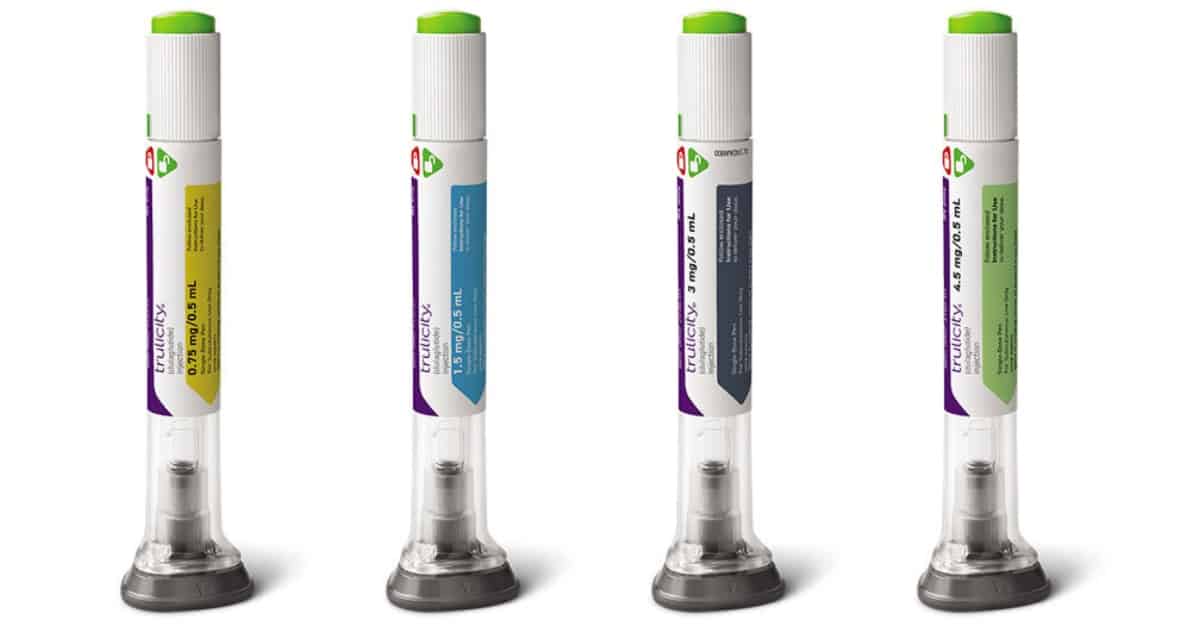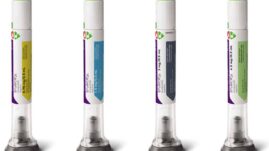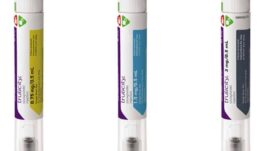Trulicity, a once-weekly injectable, is used to manage blood sugar and weight in people with type 2 diabetes.
This article explores everything you need to know about this treatment, including its benefits and side effects.

Key Points:
- Trulicity is a once-weekly injectable medication used to manage blood sugar levels and weight in people with type 2 diabetes.
- It works by stimulating insulin release, inhibiting glucagon production, and slowing digestion.
- Common side effects include nausea, vomiting, and stomach pain. Serious risks include pancreatitis and thyroid cancer.
- The medicine is not suitable for people with a history of certain medical conditions or allergies to its ingredients.
Table of Contents
- What is Trulicity?
- How does Trulicity work?
- What are the benefits of taking Trulicity?
- Why would you be prescribed Trulicity?
- What are the side effects?
- What are the typical doses?
- What is the maximum weekly dose?
- What happens if you take too much Trulicity?
- Can I miss a dose?
- How do I inject Trulicity?
- Who shouldn’t take Trulicity?
- How do I stop taking Trulicity?
- Can Trulicity replace insulin?
- Can I take Trulicity with other diabetes medications?
- Does Trulicity need to be refrigerated?
- How much does Trulicity cost?
- How do I get a prescription for Trulicity?
What is Trulicity?
Trulicity is a name-brand prescription medication for adults and children ages 10 and up with type 2 diabetes, used to help manage blood sugar levels, A1c (a measure of glucose control over the previous 2 to 3 months), and weight.
It may also help prevent stroke, heart attack, and premature death in those with type 2 diabetes and pre-existing heart disease.
Taken once weekly via injection, this drug belongs to the glucagon-like peptide-1 receptor (GLP-1) agonist class, with dulaglutide as its active ingredient.
It is sometimes used alongside insulin and other diabetes medications.
How does Trulicity work?
Trulicity binds to specific receptors in the pancreas, causing it to release more insulin, which naturally lowers blood sugar levels.
It also reduces glucagon production in the liver (glucagon is a storage form of glucose), preventing after-meal blood sugar spikes and improving insulin sensitivity.
Additionally, the medication slows digestion, suppressing appetite and promoting weight loss.
By consistently lowering blood sugar levels and A1c, it helps reduce the risk of heart attack, stroke, and premature death.
What are the benefits of taking Trulicity?
Trulicity offers several benefits for diabetes management, including weight loss.
In randomized control trials (RCTs), participants lost an average of 6.6 pounds over 6 months.
Another study found that the medicine, compared to a placebo (inactive treatment), helped lower blood sugar levels and A1c, and promoted weight loss.
Additionally, in clinical trials, participants with type 2 diabetes saw a reduced risk of major cardiovascular events, such as heart attack, stroke, and death.
The prescription is most effective when used alongside a healthy diet, regular physical activity, and other prescribed diabetes medications.
Why would you be prescribed Trulicity?
This therapy may be prescribed if you have type 2 diabetes and are struggling with insulin resistance or managing blood sugar levels.
It can also be prescribed for people without type 2 diabetes who need help with insulin resistance or managing blood sugar with other diabetes medications.
Due to its cardiovascular benefits, the treatment is sometimes given to people with existing heart disease.
While not FDA-approved for weight loss, it is occasionally prescribed off-label to help with weight management.
Learn more in: Trulicity and Weight Loss: Can Trulicity Help You Lose Weight?
Only take Trulicity if it has been prescribed to you by a healthcare professional.
What are the side effects?
Trulicity can cause side effects, especially when you first start taking it as your body adjusts. Common side effects are usually mild to moderate and may include:
- Nausea
- Diarrhea
- Vomiting
- Stomach pain
- Redness at the injection site
- Suppressed appetite
- Weight loss
- Low blood sugar (particularly if combined with insulin therapy)
Rare but serious side effects can include:
- Acute pancreatitis,
- Severe allergic reactions,
- Impaired kidney function, and
- Medullary thyroid carcinoma (MTC)
Avoid this medication if you have a personal or family history of MTC or multiple endocrine neoplasia, or if you are allergic to dulaglutide.
The FDA has issued a black box warning about an increased risk of thyroid cancer with Trulicity use. If you have gastroparesis or chronic kidney disease (CKD), consult your doctor, as the medicine may worsen these conditions.
Read more in: Trulicity Side Effects: What You Need to Know.
What are the typical doses?
Doctors typically start patients on a low dose, 0.75 milligrams (mg) once weekly, to minimize side effects. The medicine can be taken at any time of day, with or without food. To make it easier to remember your dose, stick to the same time each week.
Read more about this medicine and diet in: Foods to Avoid When Taking Trulicity.
If needed, the dose may increase to 1.5 mg after 4 weeks. For children, the maximum dose is 1.5 mg weekly, while adults may use 1.5 mg, 3 mg, or 4.5 mg weekly.
Always consult your healthcare provider before adjusting your dose, and only increase by 1.5 mg increments after at least 4 weeks on the current dose.
See more in: Trulicity Dosing: How Much Should You Take?
What is the maximum weekly dose?
The maximum weekly dose is 1.5 mg for children and 4.5 mg for adults.
Maintenance doses vary based on individual health factors, including medical history, health goals, body weight, lifestyle, and insulin resistance.
Always follow your prescribed dosage and consult your doctor before making any changes.
Learn more in: Trulicity Dosing: How Much Should You Take?
What happens if you take too much Trulicity?
The maximum weekly dose is 4.5 mg.
Taking two doses within 72 hours can cause severe side effects, including nausea, vomiting, and dangerously low blood sugar, which can be life-threatening if not treated.
Symptoms of very low blood sugar may include:
- Dizziness
- Shakiness
- Confusion
- Rapid heartbeat
- Shallow breathing
- Nervousness
- Lethargy
- Fatigue
- Unconsciousness or diabetic coma
If you suspect an overdose, contact your doctor or emergency services immediately.
Can I miss a dose?
If you miss a dose, don’t worry — you won’t experience increased insulin resistance, higher blood sugar, or weight gain from missing one week.
However, it’s important to take your medication consistently for the best results. Set a reminder on your phone to help ensure you take your dose on the same day each week.
If you’re within 3 days of the missed dose, you can take it. If more than 5 days have passed, skip the missed dose and take your next dose as scheduled.
See more in: Trulicity Dosing: How Much Should You Take?
How do I inject Trulicity?
This medicine is available in a pen form and is injected subcutaneously (under the skin).
Choose an injection site with fatty tissue, such as the upper thighs, upper arms, or stomach. Rotate your injection site each week, using a different spot within the same area (e.g., a different part of your stomach).
To inject, first wash your hands and clean the injection area with an alcohol swab.
Pinch an inch of skin, insert the needle perpendicular to the skin, and press the top of the pen to release the medication.
Keep the needle in your skin for about 10 seconds to ensure the full dose is administered.
After injecting, discard the entire pen in a sharps container, wipe away any excess medication or blood with an alcohol swab, and you’re done.
Who shouldn’t take Trulicity?
This treatment should only be taken if prescribed by a healthcare professional.
It is not recommended for those who are pregnant, planning to become pregnant, or breastfeeding.
The medication is not suitable for people without diabetes, or for those with prediabetes or type 1 diabetes, without a doctor’s guidance.
Avoid this drug if you or your family have a history of MTC or Multiple Endocrine Neoplasia syndrome type 2 (MEN 2), or if you are allergic to dulaglutide.
If you’re allergic to dulaglutide but interested in a GLP-1 agonist, consider alternatives like Ozempic, which contains semaglutide.
See more in: Trulicity vs. Ozempic: Which Medication Is Right for You?
Consult your doctor before starting Trulicity, especially if you have chronic kidney disease (CKD) or gastroparesis, as it may worsen these conditions.
Always talk to your doctor if you have any questions or concerns about taking this medication.
How do I stop taking Trulicity?
Never stop taking this or any prescribed medication without consulting your doctor.
Your doctor will likely recommend gradually tapering off the medication to avoid adverse side effects such as weight gain, a sharp increase in blood sugar levels, higher A1c, or worsening insulin resistance.
If you’re considering stopping, speak with your doctor for guidance on the appropriate next steps.
Can Trulicity replace insulin?
No, this medicine and other GLP-1 agonists do not replace insulin.
While Trulicity may reduce your need for insulin over time, it is intended to supplement insulin therapy if you are prescribed insulin.
Never stop taking your insulin without your doctor’s guidance and recommendation.
Can I take Trulicity with other diabetes medications?
Yes, but it depends on the medication. Trulicity can be safely combined with insulin or metformin.
However, you should never take it with other GLP-1 agonists, such as Ozempic, Victoza (liraglutide), or Mounjaro (tirzepatide), as this can lead to serious side effects like low blood sugar, nausea, vomiting, and diarrhea.
If you have concerns about potential interactions between your current diabetes medications and Trulicity, speak with your healthcare provider. They can suggest alternatives if there are any contraindications.
Does Trulicity need to be refrigerated?
Yes, it should be stored in the refrigerator at a temperature between 36°F to 46°F (2°C to 8°C). It can be used for up to 56 days after opening. Do not freeze it or expose it to extreme heat.
How much does Trulicity cost?
The cost each month, or your co-pay, will depend on your specific insurance plan. To find out your co-pay amount, use your prescription or medical card and consult with your insurance provider.
Trulicity is commonly covered by major health plans, including Medicare and Medicaid. If you have questions about coverage or co-pay costs, you can contact Lilly Cares at 1-800-LILLYRX (1-800-545-5979).
For eligible individuals, the Lilly Cares Foundation Patient Assistance Program may offer the medicine at no cost. To learn more about this program and see if you qualify, call 1-800-545-6962. A Trulicity savings card is also available to eligible individuals.
How do I get a prescription for Trulicity?
Speak with your healthcare provider if you’re interested in a prescription.
You may be eligible if you have type 2 diabetes and are dealing with weight management or insulin resistance.
For those with prediabetes or type 1 diabetes, the treatment may help improve insulin sensitivity.
If you do not have diabetes but are seeking to lose weight, discuss with your doctor other FDA-approved weight loss medications that may be safer and more suitable, without the side effects associated with this drug.
Did you find this article helpful? Click Yes or No below to let us know!





